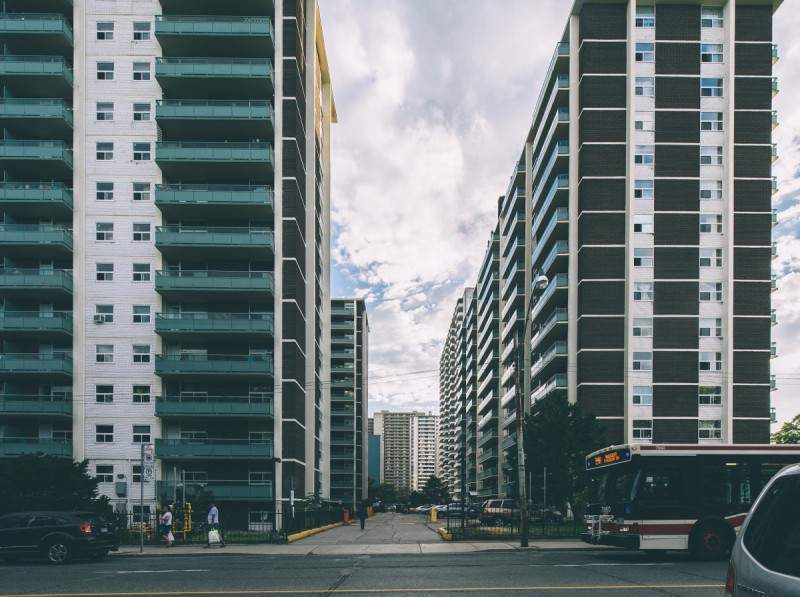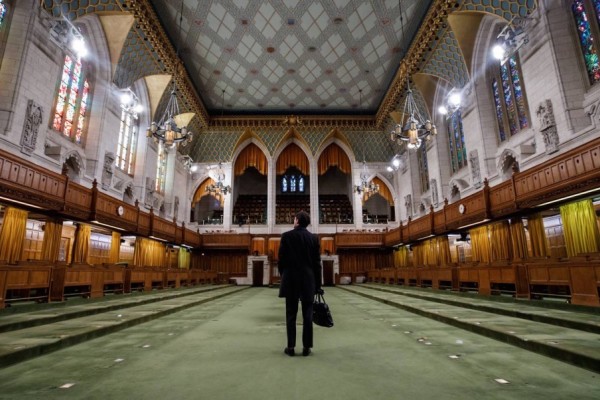What we really mean when we talk about solving the housing crisis
Despite billions spent, the housing crisis persists. It’s time to ask what problem our politicians are really trying to solve

Toronto’s St. James Town, the largest high-rise community in Canada. Photo by Ashton Emanuel/Flickr.
In his fourth-century memoir Saint Augustine recalls his youthful struggle to become a man of virtue. Confessions describes Augustine’s twenties, when the young saint was harried by a deep desire to live a temperate, celibate life, yet his status as a successful man-about-town in the bustling metropolis of Carthage led him to stumble repeatedly over his own concupiscence. His indiscretions were invariably accompanied by a profound spiritual guilt and renewed vows to comport himself with greater equanimity. It was only later, with the benefit of age and wisdom, that Augustine was able to observe that he had never actually wanted virtue at all. If he had truly desired righteousness, he would have been righteous; his perennial back-sliding was evidence that he didn’t really want to live virtuously, he merely wanted to want to do so.
Our national response to the housing crisis has a lot in common with this Augustinian ambivalence. We agonize over soaring home prices and wring our hands at the thought of generations locked out of homeownership. We spend dark nights of the soul reflecting on the skyrocketing rents that make life so hard to so many. We promise ourselves that we are going to do something about it; that we’ll restore affordability, end homelessness, and make homeownership universally attainable.
But like Augustine we stumble. The promises we make ourselves are invariably broken and, year after year, the situation goes from bad to worse.
If we wanted to create a world where everyone has affordable, dignified housing we would. We would take a track similar to France, Austria, or Finland and work to undo cultural stigmas against renting and social housing and use non-market alternatives to provide decent homes for all. But our leaders have made it abundantly clear that they have no interest in following this path. They have refused to make any attempt to decommodify housing markets, they’ve cut renters out of the conversation entirely, and they’ve allowed homelessness to become a national crisis. It is reasonable to conclude that whatever their legal obligations, our governments have no interest in treating housing as a human right.
When parliamentarians talk about solutions to this crisis housing justice inevitably takes a back seat to discussions of homeownership. Everything from the National Housing Strategy to new Prime Minister Mark Carney’s commitment to “build big, build bold and build now” affirms their monomaniacal obsession. However, Parliament’s fixation on ownership is not getting people into homes: after eight years and $100 billion of federal housing programs dedicated to building homes through the private sector, Canada’s homeownership rate has fallen from its 2014 peak. It now sits around 67 percent, with the under-40 cohort lagging behind at just 51 percent. Canada’s homeownership rate ranks 54th globally, trailing Mexico by a full 13 percent.
If homeownership is the only solution our politicians will pursue, we must ask why they have done so poorly. Countries all over the world have succeeded where our governments fail. Perhaps surprisingly, nominally communist societies have proven themselves to be especially effective here with China, Vietnam, Cuba, and Laos all having homeownership rates at or over 90 percent.
Indeed, even right-wing frameworks similar to those deployed in Canada have had their triumphs. For example, Margaret Thatcher’s pro-homeownership policies temporarily accelerated existing trends towards individual property ownership in the 1980s. Her ‘right-to-buy’ legislation saw huge swathes of the UK’s non-market housing infrastructure sold off to individual residents in a massive privatization scheme that succeeded in getting more people into their own homes.
We can readily understand why Thatcher’s policies saw homeownership rates increase when Canada’s market-oriented policies failed. While Canadian politicians transfer public funds to corporations and tell them to build housing for profit, Thatcher transferred government-owned property directly to British citizens. Thatcher used the power of the state to put people into homes without relying on the market as a middleman. Unfortunately, she treated this as a one-time opportunity. Her Tory government was not interested in building a steady stream of affordable homes to sell at a discount directly to citizens; she simply wanted to offload Britain’s stock of social housing. The consequences of this shortsightedness have become clear. Since the 1990s an increasing share of British homes have been captured by buy-to-let investors. This process of gradual commodification has led to rising housing prices and a downturn in the UK’s homeownership rate which has persisted for the last 25 years.
For Thatcher, the long-term effects of right-to-buy were unimportant. Her government sought to divest citizens from social infrastructure as quickly as possible. This alienated British subjects from their shared prosperity and converted a unionized working class into a constellation of individual, small-scale capitalists. These citizen-homeowners were to have mortgages and stock market investments which would prompt them to clamour noisily for lower taxes and bigger profits for business. In Thatcher’s view, a property-owning democracy would undermine the idea that workers’ interests are opposed to the interests of oligarchs and, ultimately, delegitimize any attempt to redistribute wealth through taxation.
We can and should be critical of Thatcher’s debt-driven model of property distribution; but for all its sinister implications, right-to-buy legislation was at least sincere in its desire to increase homeownership rates—in the short-term, anyway. In contrast, our contemporary neoliberals have given up on even these meagre benefits. Year after year the Canadian state puts billions into the pockets of banks and real estate companies under the guise of solving the housing crisis only for homeownership rates to slowly decline.
There’s an old cliché which says we are better served to judge a person by their actions than their words. If that’s the case then Canada’s abysmal housing outcomes tell us that our leaders are not interested in solving this problem. At best they are like Saint Augustine. They may want to want to solve the housing crisis, but their daily stumbling betrays their desire to keep housing as a speculative asset controlled by investors and rentiers.
Our leaders’ oft-repeated pledge to solve the housing crisis is not an endorsement of housing as a human right or even a promise that Canadians will have a bit of property to call their own, it is a guilty apologia from parliaments and city councils committed to turning our homes into sites of capital accumulation.
James Hardwick is a writer and community advocate. He has over ten years experience serving adults experiencing poverty and houselessness with various NGOs across the country.










_01_600_400_90_s_c1.jpg)